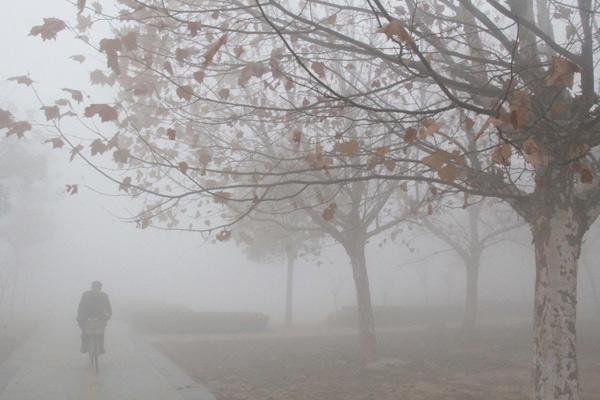|
 |
|
Heavy smog shrouds Ganyu county in Lianyungang city, East China's Jiangsu province, Dec 7, 2013. [Photo/Xinhua]
|
BEIJING - Heavy haze still shrouded north and east China on Saturday, with highways closed and flights delayed or canceled following an orange alert for haze.
Following a yellow alert for heavy fog at 6:00 am Saturday Beijing Time, the National Meteorological Center (NMC) issued an orange alert for haze four hours later.
China uses a four-tier warning system for extreme weather and air pollution, with red being the most serious, followed by orange, yellow and blue.
The NMC said on its website that from 2:00 pm on Saturday to 2:00 pm on Sunday, the Yangtze Delta region and central and southern parts of north China, including central and southern Beijing, will suffer level four to five air pollution, with the heaviest level six pollution in some areas.
Most of those areas will have moderate haze, while Jiangsu province, northern Zhejiang province, eastern Anhui province, and central and southern Hebei province will have heavy haze, said the NMC.
More than 100 entries to highways in east China's Shandong province were temporarily closed due to haze, and some flights were canceled or delayed at the Jinan and Qingdao airports.
In Jiangsu province, most expressways were closed due to heavy haze. In the provincial capital of Nanjing, red alerts for air pollution and orange alerts for heavy fog were in effect. Suzhou, Wuxi and other cities in the province also suffered the heaviest grade of air pollution.
Even in Nanning, capital city of south China's Guangxi Zhuang autonomous region, which generally enjoys much better air quality compared to other areas, was shrouded in haze on Saturday. The local meteorological department issued an orange alert for haze on Friday, the first this autumn.
Haze began to hit the central and eastern areas of the country on Wednesday. He Lifu, chief meteorologist with the CMC, described this wave of haze in a meeting earlier this week as the severest so far this winter.
The Ministry of Environmental Protection said earlier this week that there were three major reasons behind the widespread haze: unfavorable weather conditions making it difficult for pollutants to diffuse, motor vehicle exhaust, and coal consumption for winter heating.
The ministry said that, thanks to a strong cold front, the air quality in north China and east China's Yangtze Delta area will significantly improve between Sunday and Wednesday next week.
|